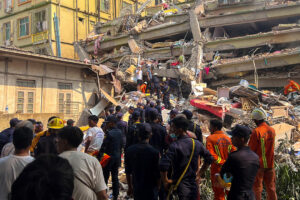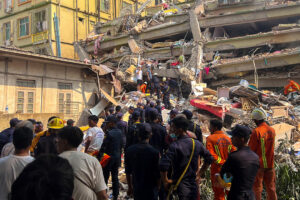Thousands are feared dead in Myanmar’s quake. Trump’s USAID cuts will cause even more unnecessary deaths

In early 2021, after a decade of political and economic reforms, Myanmar looked like it was finally beginning to shake off the hangover of decades of military rule. Foreign investment was growing, and standards of living were gradually improving.
In February that year, however, the military again grabbed power after ousting Aung San Suu Kyi’s democratically elected government in a coup. This sent the country spiraling towards civil war and social and economic collapse.
In the latest addition to the daily misery of Myanmar’s long-suffering people, a huge 7.7-magnitude earthquake hit the center of the country on Friday. Its epicenter was just outside Mandalay, the county’s second-largest city.
The Thai capital of Bangkok, more than 1,000 kilometers from the epicenter, experienced extensive damage too. Video images showed a collapsing building under construction and sloshing rooftop infinity pools causing waterfalls down high-rise condominiums.
Information on the extent of the damage in Myanmar was slower to emerge, given the junta has largely banned social media and communications apps, such as Facebook, Instagram, WhatsApp, Signal, and X.
The death toll has now passed 1,000 at the time of writing. US Geological Survey modelling, however, suggests there could be more than 10,000 deaths and economic losses potentially exceeding the country’s gross domestic product (GDP).
Unusually for the isolationist military juntas of Myanmar, its leader, Min Aung Hlaing, immediately issued a call for international assistance.
The junta, however, has full control of as little as 21% of the country in the ongoing civil war, with the rest contested or controlled by ethnic armed groups and resistance fighters. This indicates some hard-hit areas of the country may be inaccessible to international aid.
Compounding these difficulties, the Trump administration has decimated the US Agency for International Development (USAID) activities in the country. This will make it far more challenging to determine the areas most in need and distribute any aid on the ground.
NATURAL DISASTERS IN MYANMARAlong with its history of brutal and authoritarian military rule since gaining independence in 1948, Myanmar is also regularly afflicted by natural disasters.
At least 430 people are believed to have died in floods last September due to the remnants of Typhoon Yagi. In 2023, Cyclone Mocha reportedly killed about 460 of the Rohingya ethnic minority, who are largely confined to government camps in Rakhine state in inhuman conditions.
The worst natural disaster in living memory, however, was Cyclone Nargis in 2008, which left at least 140,000 dead. On that occasion, the military junta resisted international assistance, likely resulting in many unnecessary deaths.
At that time, there was no independent media in Myanmar and it was almost impossible to find out what was actually happening on the ground.
Fortunately, the proliferation of mobile phones in the last decade has allowed information to spread much more widely, even with the junta’s internet blocks and other methods of censorship currently in place.
When Cyclone Nargis occurred — the year after the iPhone was launched — only around 1% of the Myanmar’s population had mobile phones. By the time of the coup in 2021, Myanmar had a smartphone penetration rate of 114%. (This means the country has more smartphones than people.)
FOREIGN ASSISTANCE HAS BEEN COMPROMISEDWhile Min Aung Hlaing has gone farther than his predecessor in 2008 in asking for international help, US President Donald Trump’s actions have ensured that any aid will be far less effective than it would have been two months ago.
On Friday, the same day the earthquake hit, the Trump administration told Congress it would cut nearly all remaining jobs at USAID and shut the agency, closing all USAID missions worldwide.
Jeremy Konyndyk, the president of Refugees International and a former USAID official, called the move “a total abdication of decades of US leadership in the world.” He argued the firings would cut “the last remnants of the team that would have mobilized a USAID disaster response” to the earthquake.
In 2024, USAID spent $240 million in Myanmar, around one-third of all multilateral humanitarian assistance to the country.
However, since Trump’s inauguration in January, the number of USAID programs in Myanmar has shrunk from 18 to just three. Several NGOs and at least seven US-funded hospitals operating along Myanmar’s border with Thailand have been shut down.
Myanmar’s exiled independent media outlets, which shine a light on the military’s atrocities, have also seen their funding slashed by the Trump administration’s USAID cuts.
WHAT HAPPENS NOW?The day before the earthquake, Min Aung Hlaing addressed troops at the 80th anniversary of Armed Forces Day Parade. He announced national elections would go ahead in December — a vote that human rights groups are already calling a “sham.”
There is no conceivable way elections of any integrity can be held in the country under military rule or while the civil war continues to rage.
Military-backed parties have been overwhelmingly rejected by Myanmar’s electorate in every remotely free or fair election over the last four decades. This includes the most recent elections held in 2020, won by the National League of Democracy (NLD), led by Aung San Suu Kyi.
While the world should welcome — and urgently respond to — Min Aung Hlaing’s invitation for international assistance, this doesn’t mean the past is forgotten. Thousands of innocent lives have been lost as a result of the military’s unnecessary and destructive 2021 coup.
If the NLD had remained in government, the country would be infinitely more prepared to deal with consequences of this earthquake. Once again, the military’s brutal rule — and Trump’s draconian aid cuts — will no doubt cause more unnecessary suffering and deaths.
Adam Simpson is a senior lecturer in International Studies at the University of South Australia.




